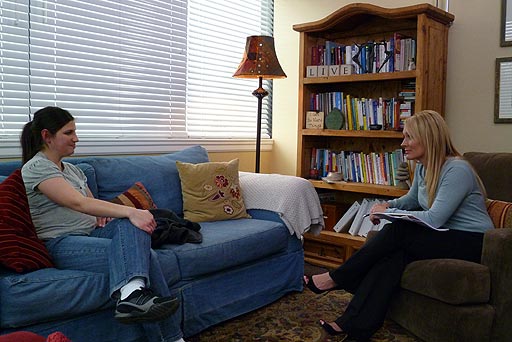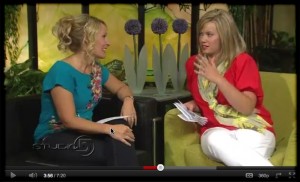 Want to tell thousands of people about your practice? Tips to landing regular media interviews.
Want to tell thousands of people about your practice? Tips to landing regular media interviews.
What do you think of when you think of professional networking? Private practice therapists who I’ve worked with in business consultations usually consider networking to be meeting with other like-minded professionals for lunch or handing out business cards to physicians offices. While those are important ways to make connections that build your therapy practice, there are other ways to get the word to thousands and thousands of people in one shot, instead of just a few folks at a time. Rarely do therapists think of networking with producers, reporters and journalists.
Over the last few years I’ve focused on developing relationships with producers, journalists, and reporters in various media platforms. There are a few who now contact me for quotes when they need expert quotes or interviews. I've landed regular local TV, radio, and news interviews as well as interviews with top-tier publications and shows: Wall Street Journal, Fox News, Parenting, Woman's Day, Women's Health, and others. Here are some things I’ve learned about what works when building relationships with reporters, journalists and producers.
1) Seek out opportunities
Keep an eye out for opportunities to interview with local and national reporters. Sign up for services that notify you of reporters looking for interviews, like Reporter Connection, ProfNet Connection, Expert Engine. Contact local radio, television, and newspaper companies and offer your expertise on newsworthy topics.
2) Know what’s ‘newsworthy’
When pitching stories or interview topics to local journalists and reporters it’s crucial to know what they’re looking for. Sorry, but the fact that you’re going into private practice specializing in family therapy is not newsworthy; however, news and other TV programs might be interested in getting your thoughts on a new study showing how cultivating self-compassion helps individuals manage divorce. I suggest getting into some “media-minded” habits:
- Watch national news headlines. Pitch a local spin on those stories to local TV producers.
- Suggest seasonal topics. Pitch interviews around managing holiday stress, or Halloween safety tips for children in October.
- New research is “news.” Keep an eye out for interesting research that’s relevant to your practice and offer to interview.
While what counts as newsworthy must be modified to your particular practice and community, MediaCollege.com generally defines a story as newsworthy if it has the following characteristics:
- Timing – News is all about stories that are current and new
- Significance – Something that affects large numbers of people
- Proximity – An event happening close to home
- Prominence – Involves someone famous or well-known
- Human Interest – Appeals to emotion, novel, off-beat, interesting
3) Know how to write a press release
When pitching to media you need to speak their language, which means learning how to write a press release.
- A press release needs to be in a specific press release format. Here’s an excellent example: EReleases.com.
- Read other releases. Here’s a release I helped one of my therapists at Wasatch Family Therapy, LLC write one recently based on her dissertation research: Mean Girls Get Married: Teens Don’t Always Grow Out of Mean Girl Behavior and End Up Using Emotional Manipulation On Spouse.
- Don’t send attachments. When you email a press release (or a pitch/proposal) to local news and TV producers, cut and paste it in the body of the email, do not send as an attachment (it’s one more thing that makes their job more difficult).
4) Respond to requests ASAP
I’ve come to realize that journalistic deadlines are incredibly tight, and the sooner I respond, the better. I’ve interviewed one afternoon for an E! Online article and it posted that same evening. When I get an email request for an interview I will respond right then on my smart phone with comments off the top of my head. I’ve been known to pull over on the side of the road while driving carpool to respond to an interview request. If a reporter or producer contacts you, respond immediately or the opportunity will pass you by. Decide ahead that you’ll say “yes” (and think about how you can make it a positive and confident “yes”).
5) Speak in layman's terms
Talking with the popular media is different than talking with colleagues. When speaking with therapists we can talk in short hand with acronyms like DBT, CBT and EFT; we know what transference and countertransference are, but most people don’t know and don’t care. In pitches and in correspondence always use layman’s terms that can be easily understood even if someone’s never taken Psychology 101.
6) Let your passion show
I think part of why I’ve been successful in getting quoted in national publications is because I show my passion for the work and for the topic of the story or article. Even in email correspondence, don’t be afraid to show your personality and to be approachable. I also openly share my gratitude for the interview opportunity and how much I enjoy media interviews.
7) Make your contact info easy to find
In all correspondence make sure that your name and credentials (the way you’d like them to appear if you’re quoted), your email address, and your cell phone number are easy to find in any correspondence or voicemail. Reporters don’t have time to hunt you down.
8) Know how to make their job easier
Reporters, producers, and journalists are extremely busy and always on multiple deadlines. They don’t have time to calm your anxiety or to walk you through the interview process.
- Send only relevant information. Highlight the most important information you’d like to talk about and a brief line or two about you and your practice or your “basic professional practice message” (see my elevator speech post). Through a brief stint as a producer and host of a local lifestyle TV show I learned what makes a good and a difficult interviewee. One of the hardest parts of screening potential guests was skimming through too much information hunting for the relevant points. You can always add more information as needed.
- Limit your correspondence. Respect the reporter’s, journalist’s or producer’s time. Though getting an interview might be a big deal for us as the therapist, it’s just one of many details they are trying to juggle.
- Know their demographics. Understand the demographic for a given newscast TV show, newspaper, or magazine so you can pitch relevant and helpful topics (have some “audience awareness”; if you don’t know the primary audience, ask).
9) Ask them to contact you again
At the end of each interview or correspondence, whether you interview or not, be sure to ask them to keep you in mind as a resource in the future and to keep your contact information should they need your expertise in the future. If you’re an easy expert to work with and you are eager to interview, my experience is that many journalists will take you up on your offer to interview again.
10) Be a resource
I’ve learned that offering myself as a resource is a great way to build bridges with the media. I often tell reporters, producers, and journalists contact me whenever they need someone to interview on a mental health or family relationship topic, and that if I can’t do it, or don’t feel qualified, I will find them someone who would do an excellent job.

 This year marks my 10th year in private practice and I've spent a lot of time reflecting on and blogging about what's contributed to the growth and longevity of my practice. As I started creating a timeline chronicling the evolution of my practice, it became clear that the growth of my private practice coincides with my online presence building efforts. I don't think it's an accident that when I began actively seeking media interviews, blogging, and building my social networks that my practice experienced tremendous growth.
This year marks my 10th year in private practice and I've spent a lot of time reflecting on and blogging about what's contributed to the growth and longevity of my practice. As I started creating a timeline chronicling the evolution of my practice, it became clear that the growth of my private practice coincides with my online presence building efforts. I don't think it's an accident that when I began actively seeking media interviews, blogging, and building my social networks that my practice experienced tremendous growth.
 If you got an email today from a local news station asking to interview you as an expert on camera about one of your specialty areas for a news story, how would you respond? Surprisingly, many therapists let the opportunity to speak on camera for a large audience pass them by because of their own anxieties and insecurities about being on camera.
Landing interviews on local news and talk shows allows thousands of people "get to know you," hear about your areas of expertise, and become aware of your private practice.
If you got an email today from a local news station asking to interview you as an expert on camera about one of your specialty areas for a news story, how would you respond? Surprisingly, many therapists let the opportunity to speak on camera for a large audience pass them by because of their own anxieties and insecurities about being on camera.
Landing interviews on local news and talk shows allows thousands of people "get to know you," hear about your areas of expertise, and become aware of your private practice.
As healers, we genuinely like to do our work. Guiding clients through the therapy process and seeing them make progress is why we do what we do. But if you're in private practice, you know there's a lot going on in the back end and that it's crucial to run an efficient and organized business.